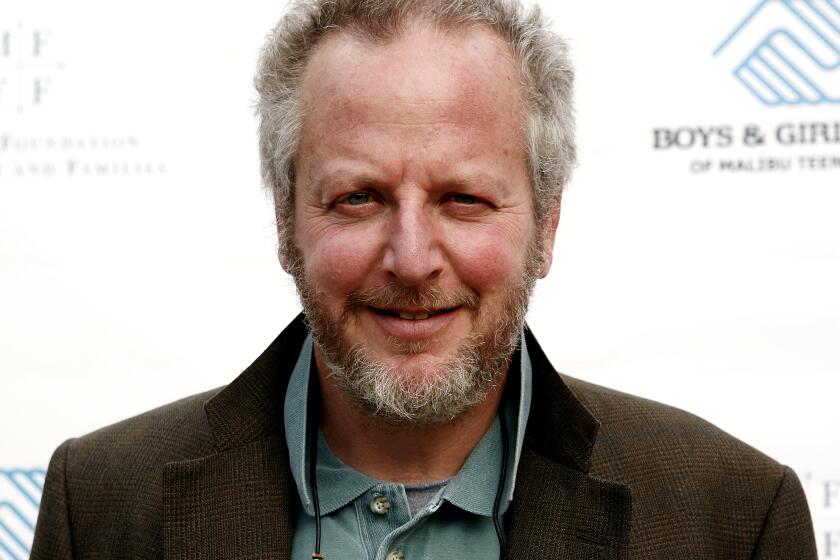Fox Criticized for Bid to Block Lawsuits : Legislation: Opponents say the studio wants unfair protection against future challenges to expansion. Film executives claim they have acquiesced to 700 conditions.
Call it “Fox, the Sequel.”
It’s the story of what happens after a major film and TV company outlasts its enemies, subdues City Hall and, after 3 1/2 turbulent years, wins approval from Los Angeles officials to pursue a controversial $200-million expansion of its studio.
In this one, studio executives still aren’t ready to celebrate.
Some thought there was cause for celebration when the City Council last month gave its blessing to the studio’s plans to add 771,000 square feet of office and production space and consolidate its movie and television operations at the same 53-acre Century City site.
But Fox executives seemed certain that its vanquished opponents--including several homeowners groups who fear that traffic generated by the project will ruin their neighborhoods--would turn to the courts in a bid to further delay the expansion.
And so with the help of state Sen. Herschel Rosenthal (D-Los Angeles), Fox officials earlier this month appealed to the Legislature and won initial approval for a bill specially crafted to protect the project from future lawsuits.
The bill, co-authored by Rosenthal and state Sen. Stan Statham, a Republican from Oak Run in Northern California who is a member of the state Film Commission, would prevent lawsuits aimed at blocking the Fox project by declaring that it complies with all local zoning and planning requirements.
The measure would also exempt Fox from further review under the California Environmental Quality Act, the main state law that regulates such projects.
Among angry state and city officials, the effort appears to have gone over like a bad party joke.
“This is the sleaziest special interest maneuver of the year,” said state Sen. Tom Hayden (D-Santa Monica), who has pledged to defeat it.
Critics say that by denying citizens of their legal rights to petition the courts for redress, the measure undermines public confidence in the planning process and sets a disastrous precedent of state intervention in local affairs.
With Hayden in the lead, opponents hope to derail the measure when the Legislature returns from summer recess in the middle of August.
“Fox has rubbed people the wrong way on this,” said Councilman Zev Yaroslavsky. “These folks are in show business, and there seems to be a certain arrogance over there that they can do no wrong.”
The City Council, at Yaroslavsky’s urging, has voted unanimously to oppose the bill.
Yaroslavsky, who was criticized by Fox opponents who felt he went too far to accommodate the studio during the lengthy approval process, has been especially critical of the studio’s latest tactic.
In a missive to Fox Vice President George Vradenburg III shortly after the Senate’s Government Operations Committee approved the measure July 13, the councilman accused Fox of unfairly trying to change the rules of the game and warned of a public backlash.
“The public will not understand, nor will they accept, Fox’s need to seek special dispensation from the law in this manner,” Yaroslavsky wrote.
In a terse reply, Vradenburg denied that the studio was trying to change the rules, adding, “We are simply trying to bring the ‘game’ to an end before all the participants die from exhaustion.”
For all the heat the studio has taken since the special legislation was introduced, Fox officials have scarcely budged in their defense of the action.
“Anyone who suggests that Fox is trying to get around CEQA (California Environmental Quality Act) is torturing the facts,” said David Handelman, another studio vice president, who dismissed the opponents to the bill as “some vocal people who have access to fax and Xerox machines.”
*
Handelman said the studio has spent $35 million to comply with more than 700 conditions imposed on the project by the city before the plan was approved.
“It isn’t as if we haven’t had an (environmental impact report),” he said. “The EIR is two feet thick. This is not about trying to skirt environmental review. It’s about getting relief from future frivolous lawsuits so that we can move forward and create jobs for this city and this state.”
The studio’s critics, including some who say the city’s environmental review of the project was inadequate, offer a different view.
“They’ve complied with 700 conditions only if you count normal building code requirements as conditions,” said Laura Lake, who heads Friends of Westwood.
Critics say the measure would have a chilling effect on attempts to curb unreasonable development.
“It’s a very dangerous precedent,” said Gabrielle Meindl, the Sierra Club lobbyist who was the only person to testify against the measure before the Government Operations Committee.
“If this project gets this exemption, you can be sure that other developers whose projects face litigation will be hobbling up to Sacramento for the same kind of relief,” she said.
She and others expressed surprise that Rosenthal, a lame-duck senator who has a strong record on environmental issues, agreed to sponsor the studio measure.
In an interview, Rosenthal said he agreed to co-sponsor the bill because he believes the project has been thoroughly reviewed by the city and that after four years, “enough is enough.” “My thought was it’s time to move on and not have the project subject to being blocked by more frivolous lawsuits,” he said.
Rosenthal noted that except for Meindl, the Sierra Club lobbyist, no one testified against the measure, which the committee approved unanimously.
“The Sierra Club made a very weak opposition,” he said. “I took it that they were kind of putting in an appearance and that it wasn’t something they were truly concerned about in any serious way. . . . The Sierra Club didn’t even call me about it. And I haven’t heard from them since.”
Meindl, the Sierra Club lobbyist, offered a different view.
She expressed surprise that the group’s opposition to the bill was not taken seriously, adding that no one from the Sierra Club attempted to contact the senator in advance because the group learned of the measure late the night before.
Meindl said she made a point of attending the session to express the group’s opposition after “hearing a rumor that Fox was implying that the Sierra Club wasn’t really opposed to what they were trying to do.”
Others contend that secrecy was to blame for the fact that no one else showed up to testify against the measure.
Hayden called the measure a “legislative sneak attack,” noting that it came nearly at the last minute after a measure originally intended to make a minor change to a state environmental law was amended to include relief for Fox.
Hayden said he learned of the measure from Handelman and other Fox officials the day of the committee vote.
“I told them this is just unbelievable that you would do something as subversive to the legislative process as this,” he said.
The senator said his opposition to the measure is based on the tactics employed, not the merits of the project. “This kind of special interest sleaze makes me very angry,” he said.
Rosenthal said that he had received at least 15 phone calls from angry constituents, but said he has no intention of backing away from the measure.
The studio and its supporters, meanwhile, announced a campaign of their own to win passage.
John Klein, who heads Friends of Fox, said more than 100 of its members have gone on record as opposing further litigation against Fox and that 350 Fox supporters have sent letters to Hayden asking the senator not to oppose the bill.
But they appear to have made no progress.
“What’s to talk about?” Hayden said. “That they’ve resorted to such extraordinarily deceitful methods says to me that they feel they don’t have a chance on the merits.”
More to Read
The biggest entertainment stories
Get our big stories about Hollywood, film, television, music, arts, culture and more right in your inbox as soon as they publish.
You may occasionally receive promotional content from the Los Angeles Times.






